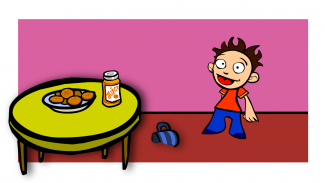
Do the Preparation task first. Then listen to the audio. Next go to each Task and do the activity. If you need help, you can read the Transcript at any time.
Preparation
Transcript
Olivia: Joe! Can you stop that please! Can you please come here and sit down!
Magda: Hello there, Olivia. Who’s this?
Olivia: This is Joe – he’s my nephew.
Magda: Nephew?
Olivia: My sister’s son.
Magda: Oh! I see. He’s lovely! I love children...
Olivia: Yeah, they’re great until you have to look after them...
Magda: You’re looking after him?
Olivia: Yeah, just for today, fortunately. My sister can’t get a babysitter. But Joe comes to my shop quite often. He loves it there...unfortunately!
Magda: Why’s that ‘unfortunate’?
Olivia: Because he’s a pest, that’s why...
Magda: What’s a ‘pest’?
Olivia: Somebody or something which makes you angry...
Magda: No!! I don’t believe it! He’s so sweet! How old is he?
Olivia: Four, nearly five.
Fadi: Whoooaaaa! Slow down there, little man! Who’s this?
Olivia: Fadi, meet Joe.
Magda: He’s Olivia’s nephew. And a sweet little pest!
Fadi: Oh really! I didn’t know you were Aunt Olivia!
Olivia: Thank you very much Fadi. You make me feel old. Listen, have you had a chat with Harry yet?
Fadi: About work?
Olivia: Yeah.
Fadi: No, not yet, but I’m supposed to talk to him today. He said he’d be in here later.
Olivia: Listen, though, it’s not true what Harry was saying...
Fadi: About what?
Olivia: About me being upset if he can’t do the website for my shop...I don’t mind if he can’t do it! He wanted far too much money. I could never have afforded it. Now it’s ok, because he thinks he’s turning me down...I don’t have to offend him by saying ‘no’! A happy result all round!
Fadi: I see...so I don’t have to bail you out, after all?
Olivia: No!
Olivia: Joe, can you stop that please? Come over here!
Fadi: ...and here he is!
Harry: Alright mate! Alright Olivia, Magda...who’s this young man?
Olivia: My nephew, Joe.
Harry: Hello Joe!
Harry: He’s very...erm...what’s the word...energetic?
Olivia: I just call him “trouble”!
Harry: So, Fadi, you wanted to talk business?
Fadi: Yeah, finally...well, I’ve got the all clear from my uncle, so we’re on.
Harry: Great.
Fadi: But...
Harry: There’s always a “but”!
Fadi: You’re going to have to do us a favour and come down on the price, mate...
Harry: What price did I quote you?
Fadi: Two thousand five hundred.
Harry: Well, seeing as you’re a friend, I could come down to two thousand four hundred, but not less than that.
Fadi: We can offer two thousand. That’s our top limit. We don’t have a bigger budget than that.
Harry: Come on! You’re joking!
Fadi: Sorry mate. It’s two thousand, or nothing.
Harry: No way. Can’t be done. I’ve got to go now...got to go and see Johnny – he’s offered me a real job...bye all!
Fadi: Oh no, do you think he’s really upset now?
Olivia: I don’t think “upset” is the word....
Fadi: We can go a bit higher actually...I was just trying to be a tough negotiator.
Magda: A bit too tough, I think.
Olivia: You should never mix work and friendship, anyway.
Magda: And you probably shouldn’t have a business meeting in a café!
Fadi: Oh no. What a mess. I’d better go. Hang on..where’s my...where are my....I can’t find my mobile! Or my keys! Has anyone seen them?
Magda: Let’s look under the seats...they must be here somewhere...
Fadi: I can’t see anything.
Magda: No sign.
Olivia: How strange...hang on a minute, my nephew’s been terribly quiet for the last five minutes...what’s he up to...Joe!!!




Hello LearnEnglish Team
What does this sentence mean ''I don’t have to bail you out"?
Thanks
Hi farivar,
To "bail someone out" is a phrasal verb. It means to help someone by solving a desperate problem that they are facing.
Here, Fadi says "I don’t have to bail you out" because in the previous episode he offered to solve the disagreement between Olivia and Harry about the website. But in this episode, the dispute is resolved, so Fadi's help isn't needed any more.
Jonathan
LearnEnglish team
Hi everyone,
It's my first question here.
Can we say "He'd be here later" instead of "He'd be IN here later" ?
If yes ? What's the difference?
Thank you.
Hello Abdu36,
Yes, Fadi could also say 'He said he'd be here later' and it would be fine.
'in here' means 'in the café' and 'here' is more general, but in the end they mean the same thing since he is inside the café.
All the best,
Kirk
LearnEnglish team
I have twin children and I laughed a lot at this sentence; "they’re great until you have to look after them."
Hello Kapil Kabir,
Simple is an adjective in both sentences, but there is a change in meaning.
In the first sentence, you make things and the things are not complex. Make has the meaning of construct or create.
In the second sentence, the situation is clarified or simplified. Make has the meaning of results in or causes to be.
As far as the names given to different types of adjectives, or rather their different roles in the sentence, it's really a question of linguistic analysis rather than language learning and so falls outside of our focus on LearnEnglish. The Wikipedia page has a good summary, however:
https://en.wikipedia.org/wiki/Adjective
Peter
The LearnEnglish Team